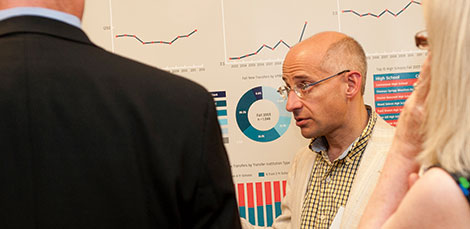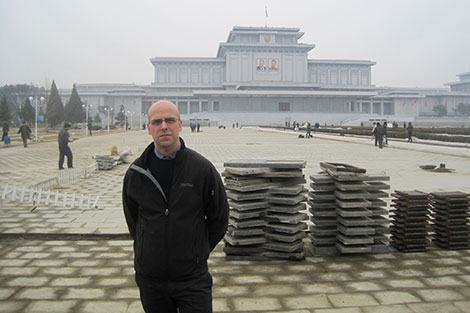What is sustainability? The concept is becoming so ubiquitous that it can be hard to pin down, especially as it relates to our everyday lives.
But Eric Zeemering, an assistant professor of public policy at UMBC, sees opportunity in the ambiguity.
Using an approach called Q-methodology (a social science research tool designed to study people’s viewpoints), Zeemering has been knocking on doors across Baltimore, asking planners, builders, environmental advocates and community leaders to describe the least and most important things that Baltimore could do to become a more sustainable city.
Zeemering’s earlier research on urban sustainability in the San Francisco Bay Area asked similar questions and got divergent answers. Architecture and planning professionals, he found, often focus on an innovative vision, such as developing new sustainable housing around transit corridors. Others who work on the issue examine how to harness neighborhoods’ existing strengths to create “vibrant,” “resilient” and “socially responsible” communities.
Regardless of their view, Zeemering believes that sustainability advocates must eschew limited definitions and work instead to integrate social, environmental and economic factors in complex ways.
“I think the biggest misconception about sustainability is that it requires people to improve environmental quality and pursue environmental initiatives at the cost of all else… [But] we’re not just called on to think about one particular type of problem within our communities,” says Zeemering. “Sustainability really asks us to think about how complex systems interact. How does the environment interact with the ability of the city to be economically prosperous and socially prosperous?”
When we think about improving water quality in the Chesapeake Bay or Inner Harbor, for example, we might simultaneously think about plant and animal life, recreation, community health and property values. By combining Q-methodology with social network analysis, elite interviews and analysis of public documents, Zeemering teases apart how a broad range urban policymakers and leaders actually address the economic, environmental and social health of their communities in relation to the concept of sustainability.
Mutual understanding is key. “Sometimes,” Zeemering suggests, “words get in our way of cooperating and working together.” But a single definition of sustainability, he continues, might not be workable. “I’m not sure we could ever, in a room, come up with [that definition],” says Zeemering.
Instead, Zeemering believes people should reflect on what a sustainable future means to them personally and what actions they want to take in their own lives to work toward that future.
“In order for sustainability to be a useful idea for individuals,” Zeemering says, “people need to make sustainability work for themselves.”
One person might stop using disposable water bottles but keep their SUV, while another might bike to work but buy bottled water at the corner store. But when people (and organizations) recognize that they have similar goals regardless of different approaches to those goals, Zeemering argues, they can begin to develop productive partnerships.
In December, Zeemering will publish the results of his current research as Collaborative Strategies for Sustainable Cities: Economy, Environment and Community in Baltimore (Routledge). He hopes his book will suggest new partnerships and paths forward in sustainability for government, businesses and nonprofits in Baltimore. He also hopes it will help residents identify where sustainability fits within their own lives, as individuals and as members of Baltimore communities.
—Dinah Winnick
Tags: Fall 2013




